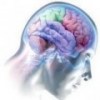Researchers at Duke University have recently invented a technique for improving the spatial resolution of magnetic resonance imaging (MRI) by a factor of nearly 100,000x. Whereas routine clinical MRI scans contain 3-dimensional pixels ("voxels") approximately 1mm x 1mm x 1mm, this new technique allows for voxels as small as 21.5 thousandths of a milimeter on each side.
This is fortunate for many mice, who in the future might no longer need to be sacrificed - but rather merely sedated - for precise neuroanatomical analysis. It is also fortunate for neuroscientists, as older histological staining methods were necessarily destructive and not necessarily completely accurate measurements of the living structures.
The new technique involves staining with a contrast agent to enhance the signal to noise ratio of MRI, with the advantageous side effect of reducing the amount of time for water molecules to relax after alignment by a strong magnetic field. This is the basis of the MR signal; tissues with less water show a different pattern of relaxation than those with more water, yielding an accurate measure of anatomical structure. Faster "relaxation times" therefore translates into faster image acquisition - great news for clinical applications where detailed anatomical scans might need to be taken quickly (and, as Michael Anes points out in the comments, perhaps even greater temporal resolution for fMRI).
There are also some fancy adaptations of the Fourier transform which are used to process the resulting magnetic signal. And we're talking about massive magnetic fields here - on the order of 9 Tesla. (Some perspective: this is equivalent in power to the magnets to be used in the Large Hadron Collider at CERN.)
The authors have graciously made all this data available online. You can also view the author's paper in Neuroimage about this exciting advance in neuroimaging technology.

I had got a desire to begin my own company, however I didn't have got enough of cash to do it. Thank heaven my close fellow proposed to take the credit loans. Hence I took the short term loan and made real my desire.
Do not a lot of cash to buy a building? You should not worry, just because this is possible to receive the business loans to resolve all the problems. Thus get a collateral loan to buy everything you require.
Holy cow! 9-tesla fields? How many universities/hospitals have magnets fo that power? And are there any health consequences for the mice (or humans) in fields of that magnitude?
That's not a magnet. This is a magnet.
I can't imagine it's healthy to have a 9T magnet pulse you.
I also don't understand why fields of this magnitude don't start to have the same effect as TMS.
Where's the resident magnetic resident physicist when you need one...
Chris, you state:
"Faster "relaxation times" therefore translates into faster image acquisition - great news for clinical applications where detailed anatomical scans might need to be taken quickly."
Images are taken plenty quickly, but faster relaxation times would allow more snapshots in a given time period, wouldn't they? Ultimately, perhaps this may allow development of greater temporal precision within fMRI.
And the other poster mentions being "pulsed" by the magnet. It's worth clarifying the difference between fMRI, where you are pulsed by an RF field and the magnet pulls the hydrogen nuclei back into alignment, and TMS, where the magnetic field is discharged against the skull.
Sorry if this is too nitpicky.
Not too nitpicky at all! Thanks for the clarifications - I'll update the post accordingly. It's possible that this could translate into better temporal resolution but I'm not sure; the current contrast agent may be lethal. But they did mention that faster relaxation times meant faster image acquisition. B/c they're dealing with so many slices, even a small decrease in acquisition time per slice can translate into large overall time savings.